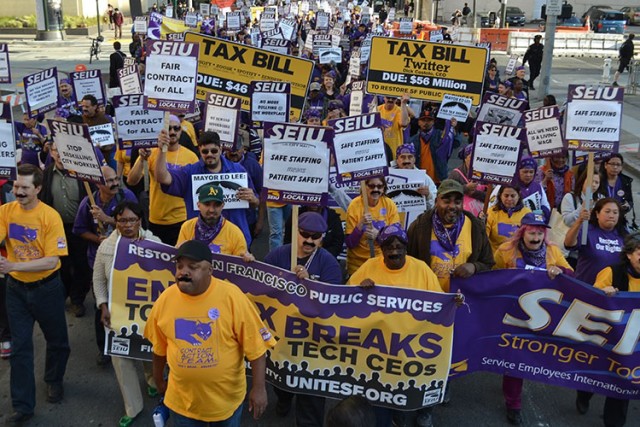Eight years after the city decided to use tax breaks to turn central market into a tech hub, the evidence suggests that the impacts of the measure were at best dubious – and at worse bad for the city – a hearing at the Board of Supes showed.
Sup. Aaron Peskin even said at the hearing of the Government Audit and Oversight Committee that the tax break was a terrible idea and “antithetical to good taxation policy.”

The Twitter Tax Break was initially approved in 2011 to encourage tech companies to stay or relocate to the Central Market are. Around 11 major tech companies, including Twitter, took advantage of the tax exclusion, saving $70 million.
In exchange these companies were required to provide Community Benefit Agreements, which were meant to mitigate the negative effects of the entrance of the high profile industry into the city.
But it became clear during the hearing that the terms of the CBAs were not defined before the tax exemption was improved, essentially allowing the companies to decide what the CBAs should be.
In other words: The tech companies decided what they wanted to do to help the community – instead of the city telling them what was needed. That, the evidence showed, was not effective.
Bill Barnes, speaking for the City Administrator’s Office, failed to provide specific and concrete data on the CBA’s impact on the community, the committee members said. Supervisor Gordon Mar argued that the information presented was mostly anecdotal. Supervisor Vallie Brown also mentioned that many of the nonprofits that she has spoken to in the area, which were supposed to be major beneficiaries of the CBAs, have felt let down by the tech companies and the lack of benefit they have brought.
The overall context for the hearing is the massive displacement that the tech boom has caused in San Francisco. The arrival of the tech industry may have filled empty buildings in mid-Market, giving a huge boon to landlords– but it also forced out a lot of nonprofits who saw their rent hikes to unaffordable levels.
Help us save local journalism!
Every tax-deductible donation helps us grow to cover the issues that mean the most to our community. Become a 48 Hills Hero and support the only daily progressive news source in the Bay Area.
And the tech companies (and the property owners) never offered to subsidize rent for those organizations.
Meanwhile, the tax break and its impacts threaten to “eat the city alive,” according to The New York Times.
Supervisor Matt Haney also mentioned that vacancy rates in the neighborhood, which were a major target of the tax exemption, which calls into question how effective the tax break has actually been in improving that part of town (or if, like in so many other parts of town, landlords have just held retail spaces off the market hoping rents will go up).
Sam Dennison of the Central Market and Tenderloin Area Citizens Advisory Committee said the CBAs have not delivered on their promises. Dennison explained that “when the elephants fight it’s the grass that hurts the most” and mentioned that the project was not a success and could even be considered “an unqualified failure in a lot of ways.”
Dennison testified that the Citizens Advisory Committee was created for the specific purpose of mitigating gentrification in these neighborhoods — but that we have still seen a lot of displacement in the Central Market and Tenderloin.
I talked with Dennison after the hearing and asked what steps could be taken in order to make these companies more accountable and, among other things, Sam explained that we have to be clear with the tech industry that they will do better if everyone else is also doing better.
And right now, everyone “else” in the Tenderloin and mid-Market is not doing better. Just the landlords and the tech industry.





